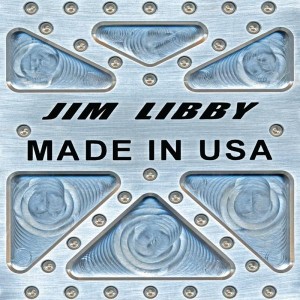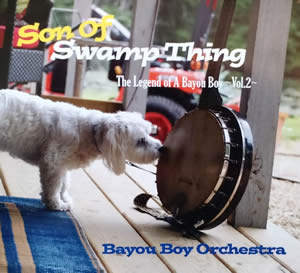
Jim Libby’s debut country rock album Made In USA is chockful of songs that have a distinct balance between a driving beat and a subtle nuance of melody. Libby’s tunefulness will make listeners want to listen carefully to every note. His force of nature rhythms will make certain they never get bored by any of that serious listening. His driving beat might have something to do with Libby being a race car driver and his solid song craft might have something to do with his being a professional welder and machinist.
“Try” opens the disc with a toe-tapping beat, a plethora of melody instrumentation, and Libby’s hearty, wholesome vocal approach. He holds his vocal notes beautifully in verses and in his hooky chorus as he rides over a mesh of pretty acoustic instruments. Libby makes you want to follow along with what he has to say because he has an earnest quality that indicates he believes in what he’s singing about.
Sympathizing with working people everywhere, “Gonna Stop Livin’ Just To Make A Livin’” is a personal plea to find more in life than one’s paycheck. Libby’s exuberant vocal phrasing is a plus in this personal anthem. He belts it out with rangy power amid a kick ass guitar break from producer David Coate. There is enough conviction here to last ten lifetimes and enough energy to power a metropolis.
Libby’s vocal approach on his title track “Made In USA” makes it hard to believe he grew up in eastern Massachusetts. He has that dye in the wool country belt that rings out with a down home timbre. Libby also manages to find a comfortable space in between Roger Trahan’s distinguished pedal steel guitar and his own steady acoustic guitar strum. Listening to that pedal steel melody unfurl is another big treat on this song.
A lively, unfettered fiddle melody from Jon Aanestad and a fun, hillbilly beat from drummer Jeff Armstrong turn “World Goes Around” into a terrific country hoedown. This compelling tune finds Libby applying his sincere emotions adeptly in between the two step shuffle. This number can be enjoyed at a barn dance or sitting by the stereo speakers taking in all the pretty melodies and voice.
“Forever” lets Libby slow things down for a piano ballad with producer David Coate. The singer-songwriter gives those acoustic instruments more breathing space. Next to his handsome, hearty, wholesome vocal timbre, the pedal steel, fiddle, mandolin notes rise in sweet tender knolls that keep this tune fulsome and organic.
“Find It” returns Libby to a country rock driving tempo. Edgy electric guitar, racing fiddle, and an aggressive vocal approach make this number rock with country bliss. Bass player Rick O’Neal struts his low end stuff around while fiddler Jon Aanestad fires off a mean solo. The band will definitely get requests for this one at their wilder party gigs.
Libby provides a beautifully lush vocal on the piano ballad “Love.” Partly haunting, the contrast between the urgency of the lyrics and the self-restraint in the mid-tempo expression keeps the dynamics tense and alive. As a singer, Libby showcases many different aspects of his timbre, tone, and range, stretching himself well through this vocal challenge of a song.
“Able” gets back into a traditional country two step beat, with twangy guitar and assertive fiddle. Libby sings out his philosophy of life with his country gentleman charm. That he can be so likable and warm while delivering his direct lyrics about the tough lessons of life shows the range of his singer-songwriter personality.
“Please Come Home With Me” is one of Libby’s most handsome vocal deliveries on this album. He’s a full-throated country boy here, sounding as expressive as the better soul singers on the scene. Gritty country instrument melodies dancing around his voice give this piece an extra heart, but it is the way Libby sustains his voice in crucial moments that take it over the top.
Libby shows his affinity for the working man in “CNC.” The opening sound effects has a worker cutting something with computer numerical control. The song is a reflection on a worker’s life while he stands in front of his CNC at his job. Libby has an earnestness in his vocal timbre that makes you realize he has lived this life, giving this whole number a deeply personal feeling. Like a true artist, Libby paints the colors of this piece perfectly. The jaunty rhythm and fetching pedal steel melody buttress the life is a challenge that must be met theme.
“Love Alive” is a large themed ballad about the trials and tribulations of having loved and lost. The song, which begins with just vocal, acoustic guitar, and a touch of bass, eventually turns into something that sounds like Journey. Organ sweeps suggest the song is beginning its mountain climb. It builds up its intensity with a feisty dynamic before shifting into arena rock. This power ballad gives Libby a chance to show what he can do with something that was probably produced to land radio play. He hits his high notes well, even if he abruptly changing genres.
Libby comes back down to earth on “Run Away With Me.” With just vocal and piano as foundation, Libby reaches deep inside himself and brings forth this honest, tender song. His voice is beautifully suited for the string section backdrop. He closes out his album with this personal note expressed with his handsome, rangy vocal.
Jim Libby is certainly onto something good here. He makes good use of the tools around him, like backing singer Kathy Sharpe and mandolin player Ken Reback. Libby will likely make a big name for himself in local country circles. There are hints of even greater potential here, and, as unusual as it might be, a country boy from the Commonwealth could find himself on a national tour with name acts.
Share on Facebook
 Jim Libby’s debut country rock album Made In USA is chockful of songs that have a distinct balance between a driving beat and a subtle nuance of melody. Libby’s tunefulness will make listeners want to listen carefully to every note. His force of nature rhythms will make certain they never get bored by any of that serious listening. His driving beat might have something to do with Libby being a race car driver and his solid song craft might have something to do with his being a professional welder and machinist.
Jim Libby’s debut country rock album Made In USA is chockful of songs that have a distinct balance between a driving beat and a subtle nuance of melody. Libby’s tunefulness will make listeners want to listen carefully to every note. His force of nature rhythms will make certain they never get bored by any of that serious listening. His driving beat might have something to do with Libby being a race car driver and his solid song craft might have something to do with his being a professional welder and machinist. Jim Libby’s debut country rock album Made In USA is chockful of songs that have a distinct balance between a driving beat and a subtle nuance of melody. Libby’s tunefulness will make listeners want to listen carefully to every note. His force of nature rhythms will make certain they never get bored by any of that serious listening. His driving beat might have something to do with Libby being a race car driver and his solid song craft might have something to do with his being a professional welder and machinist.
Jim Libby’s debut country rock album Made In USA is chockful of songs that have a distinct balance between a driving beat and a subtle nuance of melody. Libby’s tunefulness will make listeners want to listen carefully to every note. His force of nature rhythms will make certain they never get bored by any of that serious listening. His driving beat might have something to do with Libby being a race car driver and his solid song craft might have something to do with his being a professional welder and machinist.
